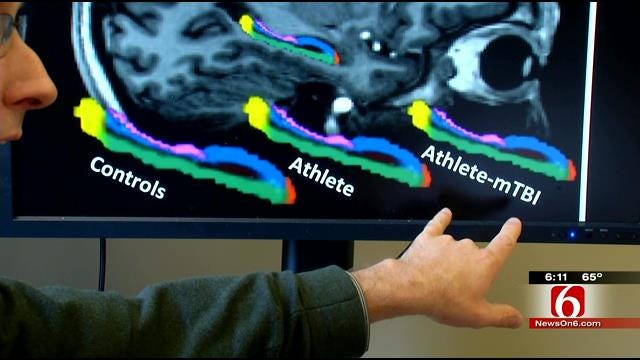TU Concussion Study Shows Memory Section Of Brain Smaller In Football Players
A University of Tulsa study looking at concussions football players who have been playing the game for a long time are left with a smaller section of the brain that controls memory.Wednesday, May 14th 2014, 7:17 pm
A University of Tulsa study looking at concussions in football players is getting national attention. It was published Tuesday in the Journal of the American Medical Association.
It found football players who have been playing the game for a long time are left with a smaller section of the brain that controls memory.
Dr. Patrick Bellgowan is a neuroscientist. His most recent study has focused on football players and their brains, specifically the Hippocampus, the area that forms memories.
"The Hippocampus is located right on the side. It's in the temporal lobe," Bellgowan said.
Bellgowan took 50 football players from the University of Tulsa and scanned their brains using an MRI. He then measured the size of their Hippocampus and compared that to a control group of students who never played football.
He found the Hippocampus in football players who never had a concussion was 14 percent smaller than the control group, and in players who had a history of concussions, the Hippocampus was 24 percent smaller.
"What we do know is the athletes with a history of concussion had significantly smaller, and that points directly to concussions," Bellgowan said.
Bellgowan is quick to say the study does not show football causes the Hippocampus to shrink, but instead, concussions can have a serious impact on the brain.
When asked if he was worried that people are going to think, it's another reason to get rid of football, Bellgowan said, "Yeah, that's one of my biggest worries."
If your child shows any symptoms of a concussion like dizziness, headaches, confusions, memory loss, and problems with their balance, Bellgowan said get them off the field and into a doctor's office.
He said brain injuries often lead to ALS or Parkinson's later in life. He said the study is a big step in looking for ways to prevent those conditions.
"Are there treatment options that, when kids get injured when their young, that can stop the brain processes that may be the slow winding trail to these really horrible conditions late in life," Bellgowan said.
He said the next step is to do more research on players in high school, or even middle school.
More Like This
September 29th, 2024
September 17th, 2024
Top Headlines
December 11th, 2024
December 11th, 2024
December 11th, 2024
December 11th, 2024












